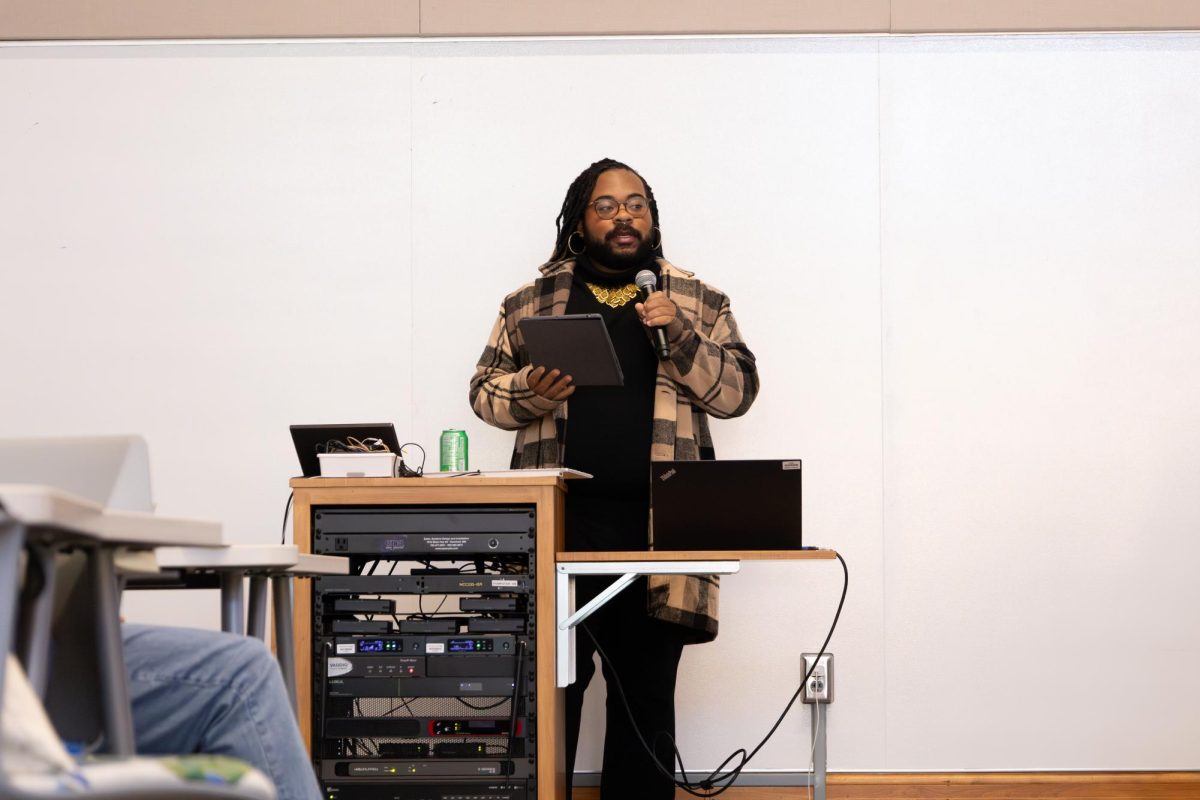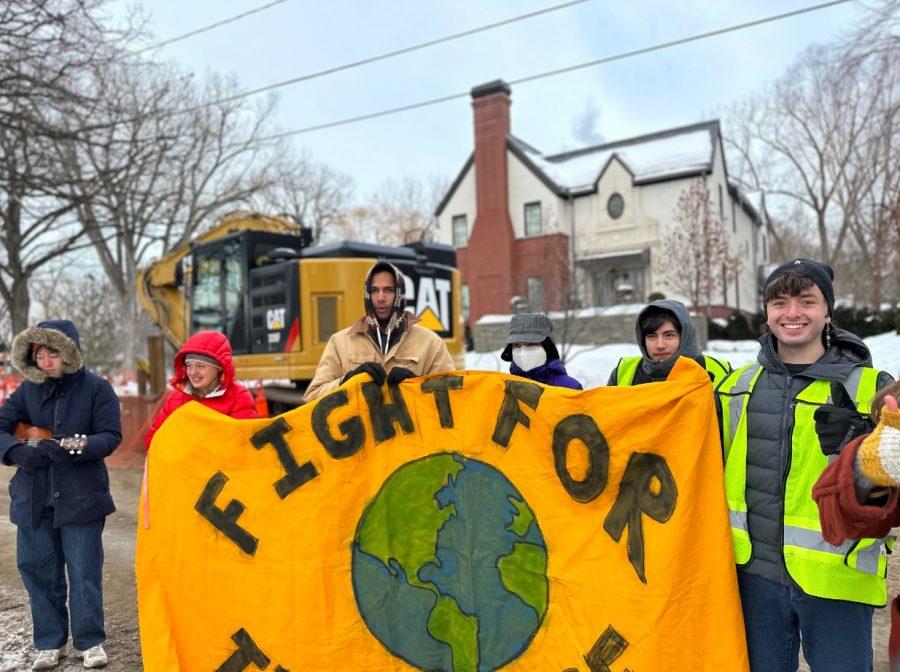Following a series of actions from Divest Carleton, a student activist group, last fall, the Board of Trustees is slated to vote on divesting the college endowment from fossil fuels. The vote, which will take place next weekend during the board’s once-a-term meeting, comes after eight years of student and alumni campaigns. The students leading the charge, including Maya Stovall ’23, see the vote as a direct result of student activism.
“It was a pretty clear reaction to student power because they had told us previously that they weren’t gonna vote until the spring or the next year, and they kept pushing it off for economic reasons,” Stovall said. “So then, moving it forward was a clear indication that we were being effective, which was pretty awesome.”
But despite Divest seeing the expedited vote as a success, the work continues for Divest organizers.
“This winter, it’s just been about trying to get full pressure on the board so that there’s no possible way that they can say no to divestment, and so that they feel like they have to vote on the most drastic plan that they possibly can,” Stovall said.
A concern for the student activists is the practical terms on which the Board is to vote. Demonstrating their continued commitment to student involvement in all stages of divestment, students drove up to the Twin Cities area to make appearances at trustees’ homes, as well as at the home of Kelsey Deshler, Carleton’s Chief Investment Officer.
“Your initial reaction when someone shows up at your door is like, ‘Oh my gosh, who’s trying to sell me something,’ or ‘Is this a Jehovah’s Witness?’” Deshler said. “And then I realized, because I could see they had a sign. I was like, ‘Oh, it’s the students.’ I recognize some of them. And so I was totally happy to have them in and chat.”
Deshler took the opportunity to explain some of the finer logistics of Carleton potentially divesting. As it stands, about one to one and a half percent of Carleton’s endowment is invested in fossil fuel extraction and six percent of it is directly invested in the general areas of natural resources and energy. As Deshler explained in an interview with the Carletonian, some of the investments within that six percent are actually working to minimize emissions.
“I was describing some of our investments in a wastewater management company,” Deshler said. “Basically, there’s water that’s involved in that drilling process, and as the product is moved out, that water could either be trucked away or it could be recycled on site. Obviously, being recycled on site saves a lot in emissions from the trucking process and just water savings as well.”
One of the key concerns for the investment office is returns in a time of high inflation.
“Inflation is a risk you want to minimize anywhere,” Deshler said. “And how do you minimize it? Well, you have to go into either inflation protective investments, or just maybe uncorrelated investments, but inflation protective assets actually have the exact inverse effect, you actually can make money during an inflationary environment.”
Oil and gas fall under the category of inflation protected investments, while renewable energy does not. In 2022 there were levels of inflation not seen since the 1980s, and the endowment’s oil and gas investments reflected that in growth.
“We did this divestment risk analysis before we had surging inflation, by the way, like inflation was picking up, but then it just went out of control,” Deshler said. “And so we got to see it real hand like what happened to the portfolio when inflation surged. And these investments, like I said, were up over 50%. They were incredibly protective against inflation.”
Deshler cooperated with trustees on drafting a statement for divestment, providing “a resource of information.” Still, the resolution the trustees are voting on remains at the hands of President Byerly and a subcommittee of trustees. This subgroup is basing the resolution on input from students, faculty, alumni and staff.
“The Board has considered a variety of sources of information on this topic over the last year and a half, beginning in October 2021,” President Byerly said. “The Investment Office developed an analysis of potential financial impacts of divestment for the Investment Committee and the Board last spring. The Board has also considered input it has received from students, including through the Divest Carleton Proposal of February 2022, the Carleton Student Association resolution of May 2020, and editorials in the Carletonian; from faculty, including through the “Sense of the Faculty” Resolution on Fossil Fuel Divestment approved earlier this month; from the Carleton Responsible Investment Committee (CRIC), most recently in its April 2022 letter; and from alumni, including Alumni Divest Carleton in their April 2022 letter to the administration and Board.”
Still, the resolution-writing process comes across as unclear for student-activists.
“This is a process that has been incredibly opaque and inaccessible to a vast majority of people that make up Carleton as a community and so our actions this term, we believe, reflect trying to get a foot in the door,” said Myles Fisher ’25, a Divest Carleton leader.
Chair of the Board of Trustees Wally Weitz ’70 argues the Board has considered ample feedback from the community.
“A number of trustees have met with interested students, faculty and alums, over a period of many years, on many occasions, to discuss divestment of fossil fuel and other types of investments,” Weitz said. “I’m pretty confident that no voice, and no argument, has gone unheard. Board meetings are not generally open events, since many sensitive topics are debated — personnel, tenure, curriculum, budgets, etc. So while a final discussion and vote are not conducted in public, there is nothing opaque about the process that has been going on for many years.”
Regardless of the result of the vote, divestment will not be immediate and likely not complete. Macalester College, an example cited by Divest students of a peer institution that has divested, continues to hold “underlying investments held by fund managers that are in oil and gas companies” as stated in the college’s press release. Similarly, St. Olaf College’s Investment Committee committed to no new investments in fossil fuels, but most of the previously held investments will be phasing out through 2034, according to the Olaf Messenger. Deshler explained similar issues, stating that some of the investments are “illiquid” and that as a result, Carleton “can’t just sell them overnight.”
Still, Weitz is optimistic about the vote.
“All trustees, as far as I can tell, are concerned about climate change,” Weitz said “Trustees are proud of Carleton’s efforts to reduce its carbon footprint and to promote environmental responsibility. There are lots of effective actions we have taken and plan to take in the future. I have a guess as to how the vote will go, but with 35 or so strong personalities on the board, nothing is predetermined.”












